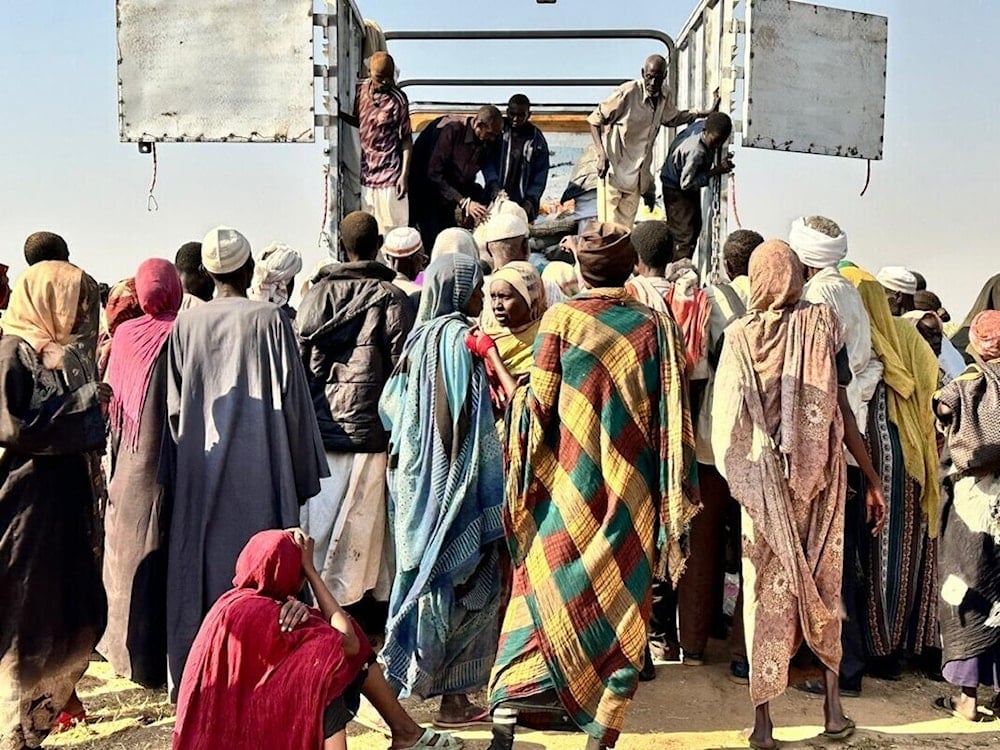Quad powers push for Sudan truce following RSF massacres in El Fasher
Several countries are leading efforts for a Sudan truce, followed by a ceasefire amid growing concern over Rapid Support Forces atrocities in El Fasher.
-

Displaced families from El Fasher at a displacement camp where they sought refuge from fighting between government forces and the RSF, in Tawila, Darfur region, Sudan, Friday, October 31, 2025 (AP)
High-level Egyptian diplomatic sources revealed in press statements on Monday that intensive efforts are underway to reach a humanitarian truce in Sudan, with negotiations and behind-the-scenes diplomatic initiatives being pursued by multiple parties seeking to de-escalate the ongoing conflict
This comes at a time when numerous countries and international organizations have expressed deep concern over the situation and condemned the violations carried out by the Rapid Support Forces during their assault on the city of El Fasher in Darfur.
The sources pointed out that "the Quad mechanism, which includes Egypt, the United States, Saudi Arabia, and the UAE, presented a proposal for a humanitarian truce during its meeting in Washington, DC, in the last week of the previous month, and the two parties to the conflict, the Sudanese army and the Rapid Support Forces, are still studying the proposal to respond to it within the framework of the Quad mechanism".
The sources clarified that no tangible progress had been made as of Sunday, with both sides still evaluating the ceasefire proposal, with no agreement reached as of yet.
According to the sources, the Quad mechanism had proposed a roadmap to resolve the crisis in Sudan, which includes a three-month humanitarian truce followed by a long-term ceasefire and a nine-month political process leading to civilian rule, while also calling for the rejection of regional interventions that fuel the internal conflict.
US advisor says US working with Sudan, RSF to reach ceasefire
Massad Boulos, the US advisor for African affairs, told the Associated Press on Monday that Washington is actively engaging with both the Sudanese army and the RSF in efforts to secure a humanitarian truce, adding that negotiations and planning have involved coordination with both sides over the past several days, aiming to finalize the necessary arrangements for the ceasefire and ensure cooperation from all parties.
“We were working on this for the last almost 10 days with both sides, hoping to finalize the details,” Boulos said, describing the US-led initiative, which envisions a three-month truce initially, followed by nine months dedicated to a political transition process designed to stabilize the country and lay the groundwork for longer-term peace.
“The atrocities that we’ve seen, of course, are totally unacceptable,” Boulos said, referring to videos circulating online that reportedly depict RSF fighters and allied gunmen engaging in beatings, killings, and sexual assaults of civilians.
Cairo working to organize forum for inter-Sudanese dialogue
In a related development, Sudanese political sources revealed that Cairo is seeking to organize a major political forum this month to discuss mechanisms for an inter-Sudanese dialogue, as a preparatory step toward a comprehensive political process if a ceasefire can be achieved.
Sudanese sources confirmed that the forum is expected to include the Democratic Bloc, Sumood, the National Movement, and other political organizations, while excluding the political wing of the Rapid Support Forces.
The sources also noted that the meeting held between representatives of Sudanese political and civil forces as part of the informal Nyon process from October 29 to 31 served as the main entry point for understanding and consultation among the various participating political forces, laying the groundwork for the discussions that will soon take place officially in Cairo.
Sudanese sources explained that if there is agreement on key issues such as a ceasefire, the political process, and the creation of a conducive environment for Sudanese dialogue and trust-building, a political document will be signed to establish and pave the way for a broader political process in Sudan.
Talks along two tracks
They added that the Sudanese dialogue will follow two tracks: 1) a political track involving civilians focused on democratic transition and institution-building, 2) a security-humanitarian track concerned with halting attacks, enforcing a ceasefire, and implementing final security arrangements.
The sources added that "a preparatory committee for the Sudanese dialogue will be formed, representing Sudanese political blocs and including independent national figures, representatives of women and youth, traditional local authorities, Sufi orders, civil society, and the parties that signed the Juba Peace Agreement."
"The committee’s primary task will be to establish the foundations and timeline for the national dialogue, preparing the agenda, identifying the parties involved, organizing the secretariat, determining the technical methods for managing the dialogue, designing its structure, and setting the schedule, while ensuring fair and balanced participation of all national components," the sources noted.
They added that the committee will operate under a purely national umbrella, with technical support from international actors acting solely as facilitators without exercising any oversight or authority over the process.

 5 Min Read
5 Min Read








